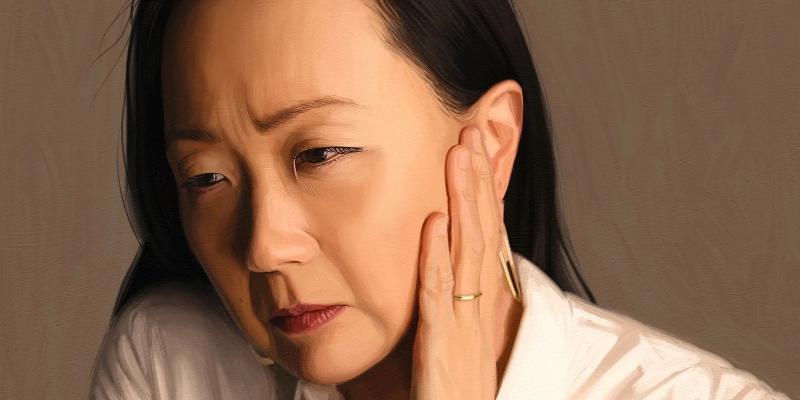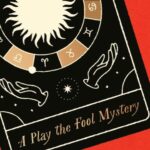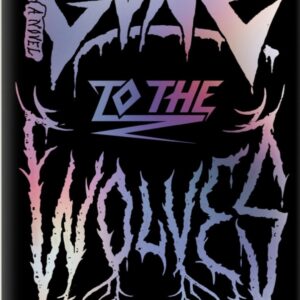“Maybe This Means Something.” Min Jin Lee on Vulnerability and Audacity, in Life and on the Page
This Week on the Talk Easy Podcast with Sam Fragoso
Illustration by Krishna Bala Shenoi.
Talk Easy with Sam Fragoso is a weekly series of intimate conversations with artists, authors, and politicians. It’s a podcast where people sound like people. New episodes air every Sunday, distributed by Pushkin Industries.
*
Live from On Air Fest in Brooklyn, our talk with award-winning author Min Jin Lee! At the top, we discuss the roadmap to her upcoming third novel, American Hagwon (4:25), immigrating from Seoul to Queens in the 1970s (7:10), and the violence her family endured working in America (15:50). Then, Lee reflects on her years at Yale (19:15), a life-changing diagnosis in college (21:37), and the criticism she overcame as a young writer (25:26).
On the back-half, Lee reads a personal passage from her New Yorker piece “Stonehenge” (33:05) and talks about finding community through her work (36:14), her path to publication in Free Food for Millionaires (38:32), how she learned to embrace the ephemeral moment (42:06), and the reform in education she hopes to see in years to come (45:12).
Subscribe and download the episode, wherever you get your podcasts!
From the episode:
Min Jin Lee: There’s this E.E. Cummings poem, “i carry your heart with me.” It’s all about how I carry you. I think that wherever I go, I’m carrying these people that I love. I think when you’re writing you can literally resuscitate people. You could have every single moment and feeling and smell and sound.
Part of what I’m trying to do is, as I carry them in my heart, I’m trying to bring you with me into my heart. Maybe that takes care of all of my awkwardness and loneliness and feeling like I don’t belong. Because what’s given me community is actually my work, in a genuine way. I’m very lucky because I have readers. I never thought I would have readers. I didn’t have agents, I didn’t have contracts, and I can’t believe this is happening.
Sam Fragoso: Before you did have readers, there was a decade out in the world where you leave your job as a lawyer, and you’re trying and trying to be a writer. There’s so much rejection and false starts that eventually brings you to your first book, Free Food for Millionaires. You said, “between 1995-2006, I felt every year more and more like I’d made a really big mistake. And if I really think about the evolution of my writing, it’s really about my inability to understand what it means to be an artist.” What did you not understand about being an artist?
Min Jin Lee: Whether we like it or not, being an artist is a self-accrediting process. Before you get the laurels and the flowers, you have to face the work that you’re making. For people like me, it isn’t like all these people wanted to see my work. When I was growing up, no one was saying, “Min, what do you think about the elections? Tell me, what do you think about the geopolitical situation in North Korea?” I mean, strangely, people ask me that now and I have to come up with answers.
The idea that you could make something starts with a little flicker of audacity. That self-accreditation saying, “I think what I have to say, make, see is worth looking at and worth sharing,” that’s different than diary writing. It’s different than doing something and keeping it in your sock drawer.
Sam Fragoso: Some part of this evolution seems tied to being vulnerable on the page, which is something you felt early on that you weren’t willing to do. When did that shift happen?
Min Jin Lee: I had to get rejected so much before I realized, what’s the point of this wish for accreditation? And what’s the wish for respectability?
Sam Fragoso: Did having that specter of liver cancer make you rethink how much you wanted to leave on the page, and how much you wanted to leave of yourself or future generations?
Min Jin Lee: It makes me think about it right this second. I don’t want to ever waste your time because my time is limited. Even though my liver issue is clear, I do think about death. I think about it all the time. It’s like that Mary Oliver poem “Wild Geese.” You want to live with vitality, you want to live with open arms. That when death comes, you’re aware of what it means, and you welcome the life that’s coming because we know we’re going to die.
People are always saying, “oh gosh, I’m getting older,” and I’m thinking, “I get to be fifty fucking four.” Because I thought I wasn’t gonna make it after thirty. And I know that sounds awfully Pollyanna, but I’m not sorry. I don’t see people who are cynical and eye-rolling creating beautiful work. If I’m vulnerable and sound corny about my life, then so be it.
Sam Fragoso: It’s odd that the potential of death, that diagnosis, in some ways, it seems like it freed you up to start living.
Min Jin Lee: I want to believe that this moment matters—that it wasn’t wasted. That somehow we’re supposed to be in Williamsburg together in this room. And if a single one of us shifted, the molecules in the air would be different. That’s why it’s so important that we hold our breath and go, “Maybe this means something.”
__________________
Min Jin Lee is the award-winning, New York Times bestselling author of Free Food for Millionaires and Pachinko, a finalist for the National Book Award. She is a Writer-in-Residence at Amherst College and serves as a trustee of PEN America and a director of the Authors Guild. She is currently at work on her third novel, American Hagwon.
Sam Fragoso is the host of Talk Easy with Sam Fragoso, a weekly series of conversations with artists, activists, and politicians. His writing has appeared in The Atlantic, Vanity Fair, and NPR. After conducting seminal interviews with icons like Spike Lee, Werner Herzog, and Noam Chomsky, he independently founded Talk Easy in 2016.




















